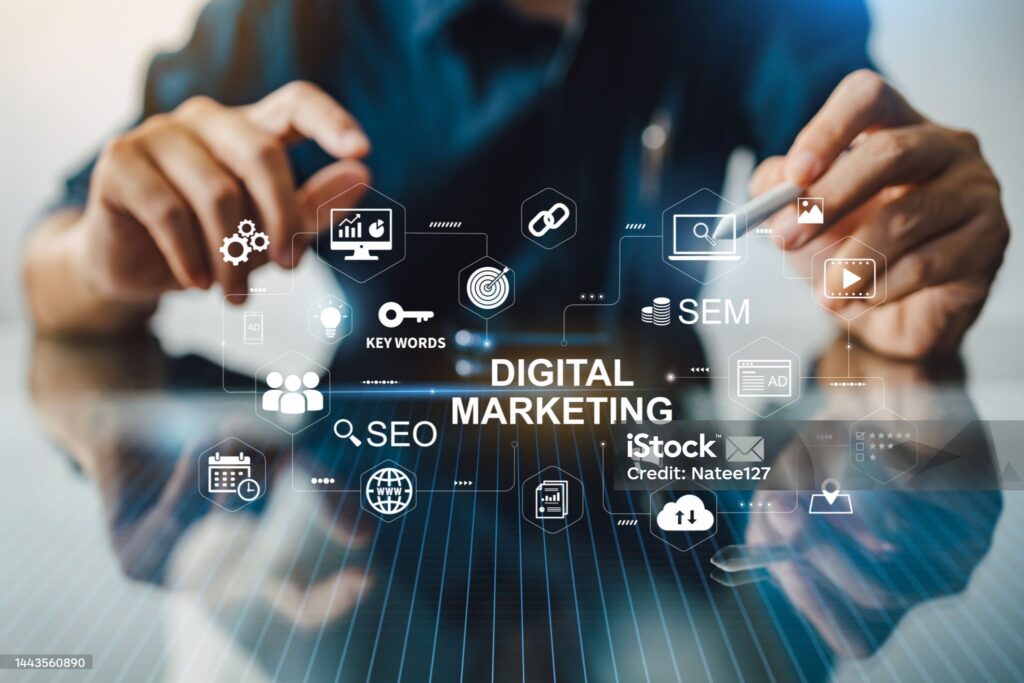Introduction
In today’s fast-paced, technology-driven world, digital marketing has become the backbone of modern business strategies. Companies, regardless of size, must harness the power of the internet to reach their target audience, build brand awareness, and drive sales. This guide will take you through the fundamentals of digital marketing, its key components, strategies, and best practices to help you succeed in the online marketplace.
What is Digital Marketing?
Digital marketing refers to the use of online channels, tools, and technologies to promote products or services to a target audience. Unlike traditional marketing methods, digital marketing leverages the power of the internet to connect businesses with potential customers in real-time, using various digital platforms and strategies.
Key Components of Digital Marketing
1. Search Engine Optimization (SEO)
SEO is the process of optimizing a website to rank higher in search engine results pages (SERPs). It involves techniques such as keyword research, content optimization, backlink building, and improving website speed and user experience. A well-executed SEO strategy enhances a website’s visibility and attracts organic traffic.
2. Pay-Per-Click Advertising (PPC)
PPC is an online advertising model where businesses pay a fee each time their ad is clicked. Google Ads, Facebook Ads, and LinkedIn Ads are popular PPC platforms. This method helps businesses gain immediate visibility and reach potential customers who are actively searching for their products or services.
3. Content Marketing
Content marketing focuses on creating and distributing valuable, relevant, and engaging content to attract and retain a specific audience. This includes blog posts, articles, videos, infographics, and eBooks. The goal is to build brand authority, trust, and customer loyalty over time.
4. Social Media Marketing
Social media marketing involves using platforms like Facebook, Instagram, Twitter, LinkedIn, and TikTok to promote a brand, engage with audiences, and drive traffic. It includes organic strategies (regular posting, community engagement) and paid strategies (sponsored posts, influencer collaborations).
5. Email Marketing
Email marketing is one of the most cost-effective ways to nurture leads and retain customers. It includes promotional emails, newsletters, personalized offers, and automated drip campaigns to engage with subscribers and drive conversions.
6. Affiliate Marketing
Affiliate marketing is a performance-based strategy where businesses reward affiliates (partners or influencers) for driving traffic or sales through their marketing efforts. This method helps companies expand their reach through third-party promotion.
7. Influencer Marketing
Influencer marketing leverages individuals with a large online following to promote products or services. Collaborating with influencers in a specific niche can enhance brand credibility and reach a broader audience.
8. Video Marketing
Video marketing involves creating engaging video content to promote a brand, educate consumers, or showcase products. Platforms like YouTube, Instagram Reels, and TikTok offer excellent opportunities for video marketing.
9. Mobile Marketing
With the increasing use of smartphones, mobile marketing has become essential. It includes SMS marketing, mobile apps, push notifications, and location-based marketing strategies to reach users on their mobile devices.
10. Conversion Rate Optimization (CRO)
CRO focuses on improving website performance by increasing the percentage of visitors who take a desired action, such as making a purchase, signing up for a newsletter, or filling out a contact form. This involves A/B testing, improving user experience, and refining call-to-action elements.
Digital Marketing Strategies for Success
1. Define Your Goals
Before starting any digital marketing campaign, it’s essential to have clear objectives. Common goals include brand awareness, lead generation, customer engagement, and sales growth.
2. Know Your Target Audience
Understanding your audience’s demographics, interests, behaviors, and pain points helps tailor marketing efforts effectively. Market research and customer personas can provide valuable insights.
3. Optimize for Search Engines
A strong SEO strategy ensures that your website appears at the top of search results, increasing organic traffic and visibility.
4. Leverage Data and Analytics
Digital marketing provides access to vast amounts of data. Tools like Google Analytics, SEMrush, and HubSpot help track performance, measure ROI, and optimize strategies.
5. Engage on Social Media
Actively participating in social media conversations, responding to comments, and sharing valuable content builds brand loyalty and a strong online community.
6. Personalize Your Marketing Efforts
Consumers respond better to personalized experiences. Use segmentation, behavioral targeting, and AI-driven insights to deliver customized content and offers.
7. Implement a Multi-Channel Approach
A successful digital marketing strategy integrates multiple channels—SEO, PPC, social media, email, and content marketing—to create a seamless and engaging customer journey.
8. Stay Updated with Trends
Digital marketing is ever-evolving. Keeping up with the latest trends, algorithm updates, and emerging technologies ensures continued success.
Common Mistakes to Avoid in Digital Marketing
- Ignoring Mobile Users – Ensure your website and marketing campaigns are mobile-friendly.
- Not Defining a Clear Strategy – Random marketing efforts without a clear plan lead to wasted resources.
- Neglecting SEO – Without proper SEO, your website may struggle to attract organic traffic.
- Failing to Measure Performance – Regularly analyzing key metrics is crucial to making data-driven decisions.
- Overlooking Content Quality – Low-quality content can harm credibility and engagement.
- Ignoring Customer Feedback – Engaging with customer reviews and feedback helps build trust and improve services.
Future Trends in Digital Marketing
- Artificial Intelligence (AI) and Automation – AI-driven tools are enhancing customer personalization, chatbots, and predictive analytics.
- Voice Search Optimization – With the rise of voice assistants like Siri and Alexa, optimizing for voice search is becoming essential.
- Interactive Content – Quizzes, polls, and AR/VR experiences are gaining popularity to boost engagement.
- Sustainability Marketing – Consumers are increasingly valuing brands that promote eco-friendly and ethical practices.
- Metaverse and Virtual Marketing – Brands are exploring virtual spaces and experiences for marketing and customer engagement.
Conclusion
Digital marketing is a dynamic and ever-evolving field that offers endless opportunities for businesses to grow and succeed. By understanding its key components, implementing effective strategies, and staying updated with trends, you can maximize your online presence and drive sustainable business growth. Whether you’re a small business or a large enterprise, embracing digital marketing is no longer optional—it’s essential for long-term success.

